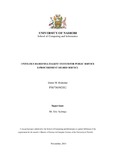| dc.description.abstract | The research shows public service procurement is guided by public procurement and
disposal act 2005 which stipulate the stages that government department must follow when
procuring good or services. The stages are : pre-qualification , Identification of
requirements, definition of requirements, determination of source, evaluation and selection
of vendor, contract award, contract implementation/ delivery , storage, payment and
disposal. There has been attempt to automate the processes which of latest was to prequalifying
the suppliers online starting august 2014. However, the process of tender
evaluation has remained manual which is prone to human interference, tedious, time
consuming, perusing volume of documents and difficult to adhere to 30% allocation of
tenders to special group unless manual analysis is done. The research undertaken shows
that ontology based multiagent system can be used in developing public procurement
tender evaluation system. This was achievable because agents offer unique features of
autonomy, social ability, reactivity, temporal continuity which lacks in object-oriented
language. To achieve the goal of tender evaluation, a number of agents were identified to
work together by sharing information seamlessly which was enabled by use of ontology's
embedded in jade environment. The agents were determined based on the processes
undertaken before evaluation can be achieved. The processes included: identification of
specification, generation of evaluation criteria, advertisement and response of tenders,
technical and financial evaluation, and notification of bidders. Every stage was handled by
agent which worked based on the knowledge it has while perceiving the environment. The
prototype was evaluated using the business owner and response was positive. The results
shows that, transparency, low cost, reduced tender evaluation time and allocation of 30%
to youth, women and disabled in tender evaluation can be achieved through multiagent
system. The study recommend piloting of the system in all government departments for
them to appreciate and adopt use of software agents in tender awarding processes. | en_US |

